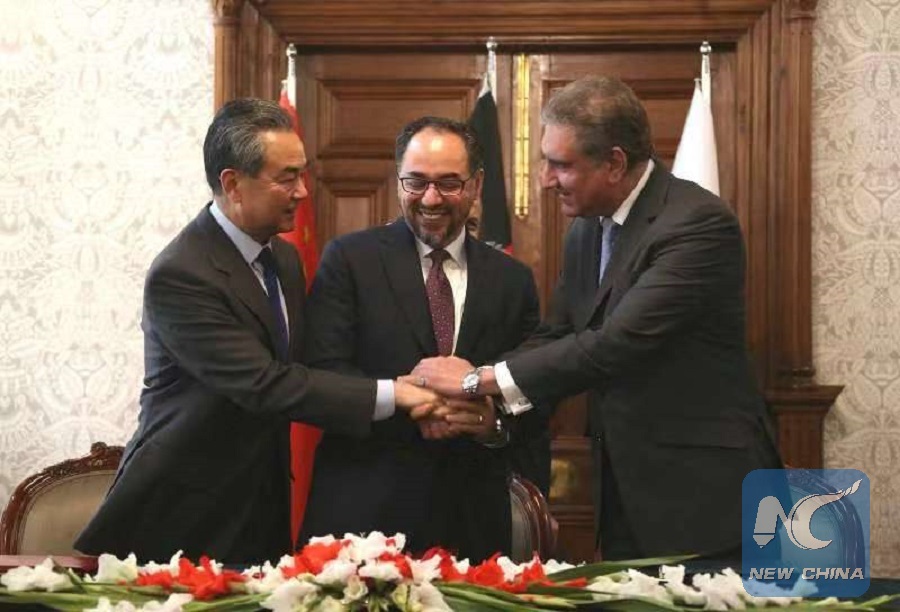
Chinese State Councilor and Foreign Minister Wang Yi, Afghan Foreign Minister Salahuddin Rabbani and Pakistani Foreign Minister Shah Mahmood Qureshi (L-R) shake hands after signing an agreement during the 2nd China-Afghanistan-Pakistan Foreign Ministers' Dialogue in Kabul,Afghanistan, on Dec. 15, 2018. (Photo: Xinhua)
China, Afghanistan and Pakistan signed a memorandum of understanding (MOU) on counter-terrorism and agreed to expand cooperation under the Belt and Road initiative (BRI) on Saturday amid a depressed economy and deteriorating security situation in Afghanistan after US troop withdrawal.
"The move may lead to sabotage from India in order to destroy the implementation of BRI in Pakistan," warned Hu Zhiyong, a research fellow at the Shanghai Academy of Social Sciences' Institute of International Relations.
The MoU was signed during the Second China-Afghanistan-Pakistan Foreign Ministers' Dialogue that was held in Kabul, Afghanistan, the Xinhua News Agency reported Saturday.
The three sides vowed to enhance dialogue on counter-terrorism policies and push forward pragmatic counter-terrorism cooperation.
Amid important opportunities in Afghanistan's reconciliation process, the three sides are willing to strengthen coordination and push for the Taliban's early return to the negotiation table and reintegration into mainstream politics, Chinese Foreign Minister Wang Yi was cited as saying at a press conference after the dialogue by Xinhua.
The first trilateral foreign ministers' dialogue was held in December 2017 in Beijing.
Compared with their neighbor India, China is more capable and experienced in counter-terrorism and thus is the most fitting leader for the two countries in anti-terrorism, Hu noted.
India has always believed the BRI is a strategy by China to encircle India and show its dominance in Asia and has been accused by Pakistan of supporting the nationalist insurgents in the Baluchistan province.
Separatists from Baluchistan who oppose BRI projects in the province claimed responsibility for an attack in November against the Chinese consulate that killed four people, The Irish Times reported in November.
Meanwhile, Li Wei, a counter-terrorism expert at the National Defense University, told the Global Times on Sunday that in a long run, India will also benefit from a better security situation in South Asia.
Li noted that China upholds the win-win strategy and its principle of "Afghan-led and Afghan-owned" in promoting the reconciliation process in accordance with the country's own will with regards to the issue, which is a major reason for the smooth proceeding of the trilateral dialogue.
The Afghan government announced an unconditional four-day truce with Taliban insurgents for Eid al-Fitr holiday, Reuters reported on June 7. It is for the first time since the US started military operations in Afghanistan in 2001.
But Taliban refused to extend the truce after the holiday and asked to discuss the withdrawal of foreign troops first, The Guardian reported in January.
US President Donald Trump's envoy to Afghanistan Zalmay Khalilzad is contacting many top Taliban figures, trying to peacefully end the war so Trump can pull the plug on current American military operations in Afghanistan well before the US presidential election in November 2020, NBC News reported in November.


